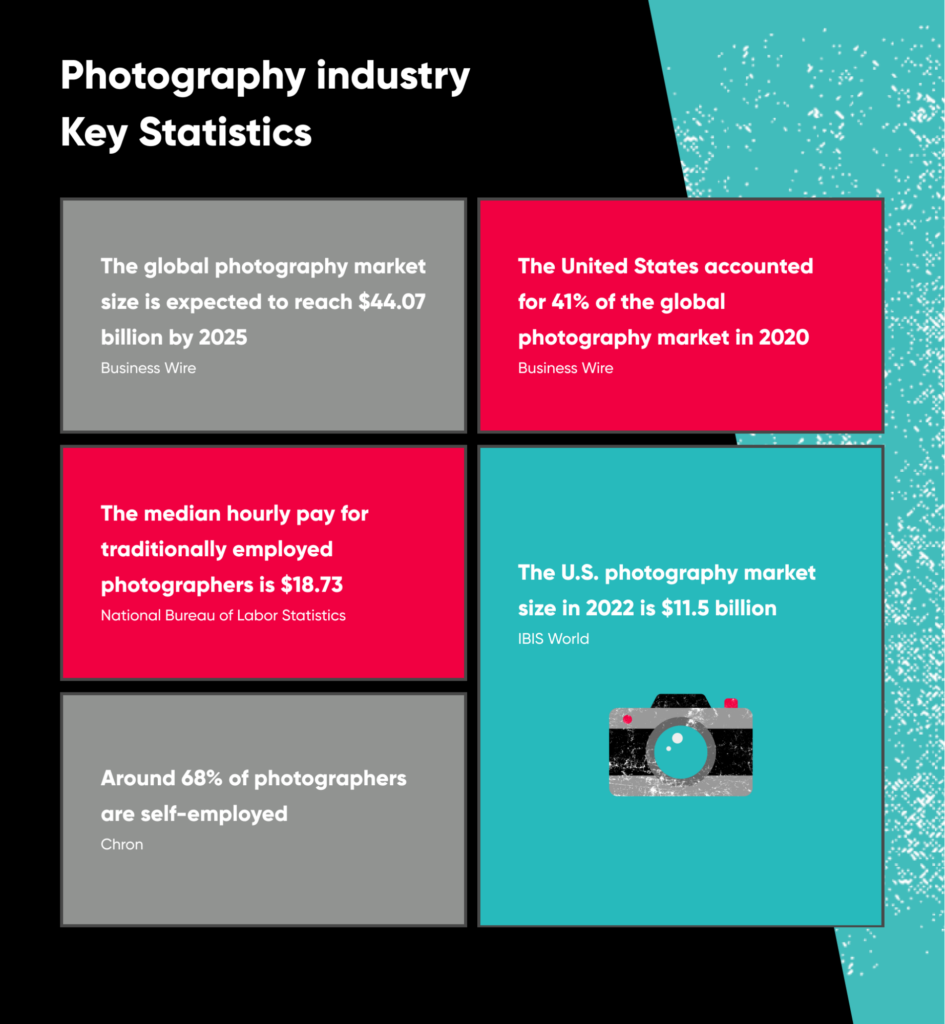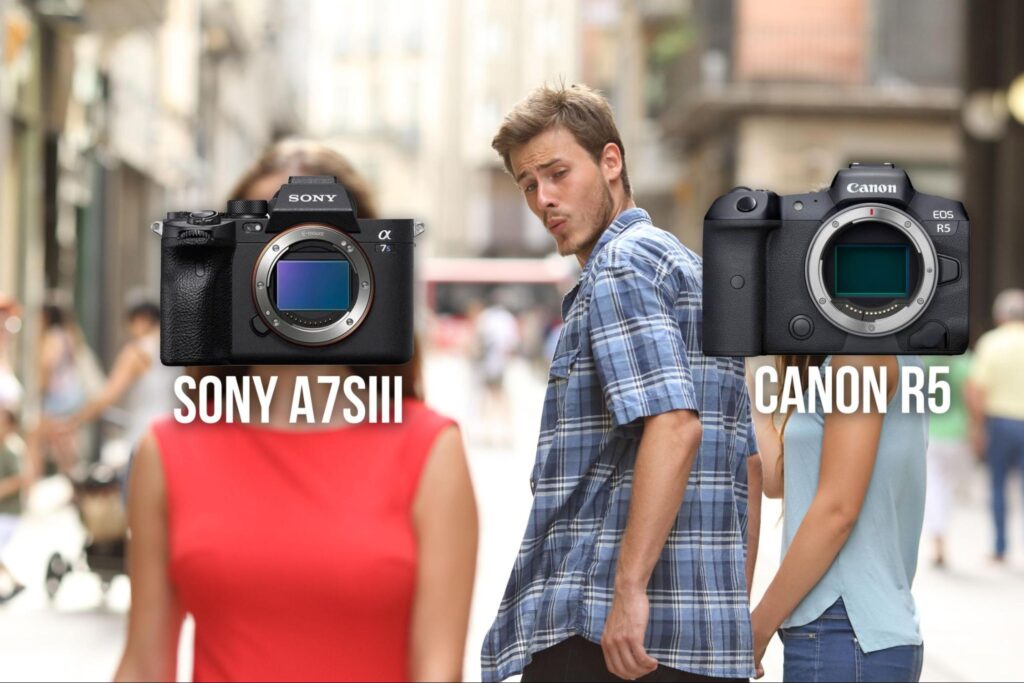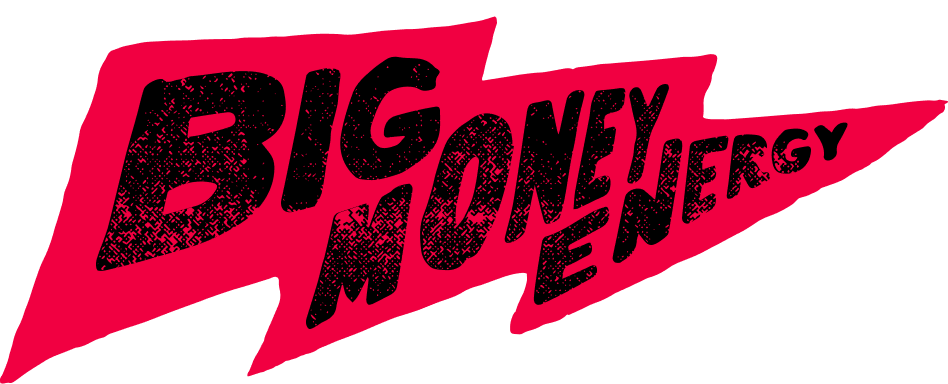
Obsessed with selfies?
Always able to capture the perfect landscape shot while traveling?
You might love working as a professional photographer.
It’s a fun and creative field that’s an ideal match for someone who loves the idea of making money with art. Plus, the fact that the forecasts show that the photography industry will grow by up to 9% by 2031 makes it pretty attractive.
You could build your own photography company if you match your artistic eye with basic business skills.
But, new photographers face several challenges in launching. Most new business owners are better off taking the unconventional route of buying an existing photography business.
Here’s what you need to know if you want to start your own photography service and why you should give a second thought to buying one instead.
Buying a Photography Business Vs. Starting One: Which is Better?
Self-starters face an uphill battle with photography. Just to name a few:
- Most cities and towns have entrenched competitors in place.
- Prospective clients want to see your portfolio before they book you (a classic chicken-and-egg scenario).
- Gear is expensive. A common professional toolbox lens from Canon, for example, retails at $2,100. And that’s just one piece!
- One piece of gear isn’t enough. You’re going to need backups in case something breaks.
And here’s the big one: photography is so much more than snapping the picture. You have to:
- Plan the shoot
- Coordinate with everyone who’s involved
- Edit the proofs
- Review the proofs with clients through the retouching process
That’s a lot of work before you finally get paid. Hope you like late nights!
The truth? Plenty of new photographers eke out a side hustle for years before turning it into a full-time gig. Your runway to full-time employment could be far longer than you expect.
But there is a way you can avoid these launch challenges and step right into a strong operation.
Find a photographer who’s ready to pass the torch and buy their business.
If you do that, you’ll trade in for an established reputation, any staff and equipment you work into the deal, and maintain customer trust by working with the previous owner during the transition period.
Buying one of these companies is within your reach, too. You can find them for sale online on sites like:
You can also find off-market deals on BizScout. (Full disclosure: We own BizScout, but it’s a great way for entrepreneurs to find businesses that are hidden gems.)
And you can use seller financing to score one on terms you couldn’t get with a bank loan for a startup photography shop.
If you still want to build your own brand, though, follow these steps to start your own photography business.
1. Market Research

Before committing to anything, research the market. What kind of photography do you want to offer?
Plenty of options exist. You should be able to find something that aligns with your personal interests and market demand.
A few popular niches in the photography world include:
- Product photos
- Corporate/business photos
- Family photos
- Boudoir photos
- Wedding/engagement photos
- School photos and senior pictures
- Modeling/brand photos
- Event photos
Look into existing photographers in your area to see what they offer and how they charge.
You might discover that there’s an entire type of photography that’s not in your market yet. You’ll also discover pricing tactics and what bundles or packages your competitors offer.
Buying an established photography business bypasses a lot of market research. An existing business will understand its place in the market and comes with a full suite of services and pricing tactics out of the box.
2. Create Your Business Plan

For a new photographer, a business plan lays out all the important details behind the company launch. That includes things like:
- A market analysis
- A listing of your services and proposed rates
- Your marketing plan
- A list of startup costs, including all your equipment
- Your financial projections
Your niche determines your gear to a degree, but all photographers need some basic tools:
- A professional camera
- Lenses
- Flash attachments/speed lights
- Memory cards
- A computer capable of handling massive photo sizes
- Photo editing software, like Adobe Photoshop and Lightroom
- External hard drives
- Backup batteries
- Backup camera
- Backdrops and props for studio work, if applicable
Some people can start with just one camera and lenses they already own. But it depends on the gear you have in your camera bag.

Your Canon EOS Rebel won’t cut it. Invest in a prosumer-level DSLR or mirrorless camera.
You’ll also need a more diverse set of lenses as you grow. Many new photography business owners spend a big percentage of their profits reinvesting in lenses until they have a wide range of glass.
All of your financial plans for getting lenses and camera bodies need to be in your business plan. These aren’t cheap products, and you need to set a roadmap for when you can buy each piece.
And cameras aren’t the end of the story. You still need to budget for the other gear and software.
Your photography business plan also needs to go into detail on your prices.
But there’s a catch.
Customers will haggle with you when you’re brand new.
People don’t see the difficult behind-the-scenes work that goes into taking great pictures. They only see someone who presses the shutter button.
They have iPhones that can do that, so your services must be cheap, right?

Until you have a strong portfolio, you’ll need to stand firm on your rates (and know when and how you can flex them).
Revising a business plan from a successful business is easier than starting from scratch. If you buy a photography business, you’ll see what their current plan is. You can start out by spotting opportunities for improvement and growth instead of planning how you’ll scrape by.
3. Register and Set Up Your Business
Once you know what you’ll offer, it’s time to claim your name and register with the secretary of state.
You’ll form a company as either:
- A sole proprietorship (a super simple business model with just you as the owner)
- A limited liability company (which you can run solo or with members and which protects your personal liability)
- A corporation (more complicated, but with potential tax benefits if you earn a lot)
If you intend to offer studio work, start shopping around for an appropriate space. You can trick out a lot of spaces with good bulbs, but your ideal location offers natural light.
Don’t forget insurance during this phase, either. You need at least:
- General liability insurance
- Workers comp insurance (if you hire employees rather than contractors)
- Errors and omissions coverage (in case a client’s dissatisfied)
Check with your city and state to see if you need any specific licenses to operate your business, too.
If you buy a business instead, you just need to check that they have all of this in place. You’ll have fewer hoops to jump through when it comes to registration and insurance.
4. Secure Financing for Your Photography Gear
With your list of needed equipment, you can start shopping for additional gear.
Many new photographers start out using personal savings or credit cards.
You can buy basic gear on credit and even get good terms. But that doesn’t make the interest disappear. You’ll need to get paying customers quick to recoup your costs and fund future purchases.
Most studio photographers will need a business or bank loan.
You have to have the right space to take photos, and locations aren’t free. Make sure your business plan is airtight to convince a lender this is a good investment.
Buying someone else’s photography biz can actually simplify the financing process.
For one thing, you’ll get all the equipment you need. You can throw in a studio space, too, if that’s your jam.
You can also negotiate a seller-financed deal with the owner. This allows you to offer them an upfront down payment and customized payback terms.
5. Start Marketing Your Business (and Never Stop)
A picture is worth a thousand words, and that’s never more true than for professional photographers.
In this creative and visual field, an ever-evolving portfolio inspires potential customers to hire you.
Showcase that portfolio in traditional advertising and digital marketing. Create a stunning website with your work and share it on social media as you complete jobs, too.
Reviews go a long way in word of mouth marketing, so ask your customers to give you feedback on your Google Business profile.
Staying in touch with past customers, too, reminds them to hire you again in the future. Use a customer relationship management system (CRM) like HubSpot to offer promotions.
Photographer Angela Divine captures potential customers with a social media posting guide. She then markets to them using her email newsletter with tips and advice.
If you buy someone else’s business, you can tweak their website and other marketing strategies. But it’s much easier to secure new business with reviews and a website already in place.
6. Build Out Your Operations
Operations isn’t super sexy compared with the fun of planning and completing shoots. But it’s vital for your long-term success.
A few key things can really help smooth operations:
- Pick a project management tool like Asana, Trello, or Clickup to track the status of all open projects and quotes.
- Choose a scheduling software that works well for you and any other stakeholders, like hair and makeup artists needed on set.
- Purchase accounting software like Xero or Quickbooks to track every dollar in and out (you’ll really thank yourself for this one at tax time.)
When you buy another photographer’s business, you don’t just get the equipment. You’ll get all of the operations and support systems that lead the business to success. That’s less setup time, so you can get right to work snapping pictures.
Growing Your Photography Business
To grow and scale a photography business, you need more hands on deck. Hiring an assistant will streamline scheduling, day-of support, and customer service.
You can also grow by branching out into different services like videography.
When you can offer more value to clients, you can also raise your prices.
For example, check out photographer Kathy Howard, who does premium branding photo sessions. She markets them with before/after photos on her website, and these packages include things like:
- Zoom or in-person advance color and clothing choice consults so the client knows exactly what to bring on the big day for maximum impact and variety.
- Hair and makeup services on set so the client doesn’t have to think about anything but showing up for their photo session.
- Downloadable digital versions of photos, as well as the option to get canvas prints or a full photo book of every chosen picture.

Or Sarah Petty, who focuses on family and child photos. She offers print photo decorating consults that reduce stress for parents while promoting buying her physical prints (win-win!)

Over time, you might even hire other photographers to take on more gigs.
Picture Perfect Beginnings: Launch Your Photo Business
While some training in photography helps, it’s also not required to start your own photography company.
With a great eye for what looks good on camera, some pro equipment, and a marketing plan, you can get out there and start earning pretty quickly.
If you decide to buy someone else’s photography company instead, you can avoid many of the early challenges and risks of stepping out into this creative field. Then, you can optimize and grow!




